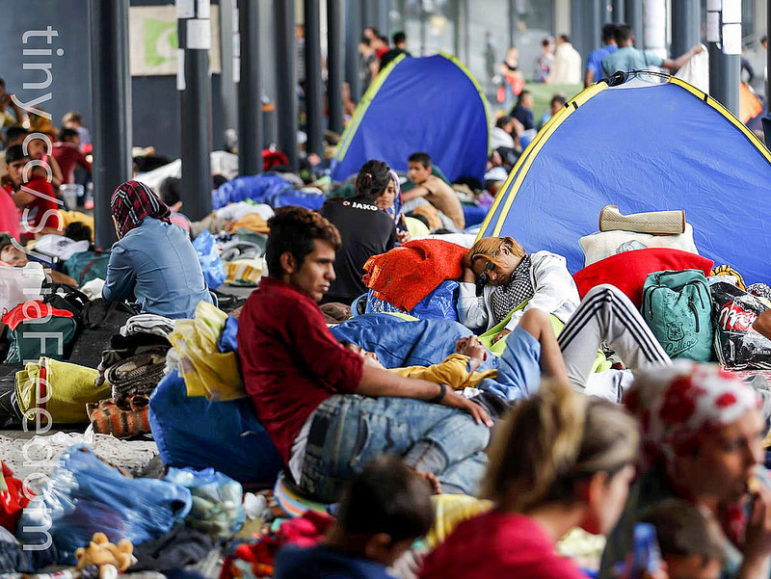
June 23, 2016; The Guardian and Al Jazeera
There are many artists at work in the world creating socially conscious and politically engaged art, but most work at some distance from the beneficiaries of their skilled effort. Not the New York–based members of the Refugee Orchestra Project. Founded by refugees from Russia and Syria, the ensemble aims to bring a personal face to the refugee crisis by showcasing these individuals’ importance to a country’s cultural wealth.
Lidiya Yankovskaya, artistic director and conductor of the orchestra, fled Russia as a child and sought asylum in the United States. Her approach to founding the orchestra is simple: “almost everybody came here from somewhere and came to escape persecution of one sort or another.” By sharing their talents with a larger audience, Yankovskaya and the members of the Refugee Orchestra Project hope that the power of music will help bring common ground to this fiercely divisive political issue. The orchestra aspires to create a greater base of support and understanding for refugees around the world.
Yankovskaya continued: “I was hoping that this project would showcase the importance that refugees continue to play in our culture and society while also raising funds for those in need.” According to the UN Refugee Agency, as of December 2015 there was a total of 65.3 million refugees in the world. On average, 24 people are forced to flee their homes every minute. As NPQ recently reported, this figure is historically unprecedented.
Made up of both amateur and professional musicians, the project seeks to make visible the faces of refugees who live and work in our communities. It is easy to think of refugees in abstract terms and to believe that those impacted by the refugee crisis are far away—but, as Yankovskaya has pointed out, this project reveals that refugees are, more often than not, our neighbors, colleagues, and friends. The historical measure of this cause was revealed in the musical choices of the ensemble’s first performance in New York, on June 20, which featured works by composers who were once refugees, including Kurt Weill, Paul Hindemith, Darius Milhaud, Irving Berlin, and Sergei Rachmaninoff.
Sign up for our free newsletters
Subscribe to NPQ's newsletters to have our top stories delivered directly to your inbox.
By signing up, you agree to our privacy policy and terms of use, and to receive messages from NPQ and our partners.
New York is not the only place where the refugee crisis has inspired and impacted contemporary classical performances. Five years ago, the Syrian National Orchestra for Arabic Music (SNOAM) played to audiences in the Damascus Opera House, employing diverse headliners from Plácido Domingo to Gorillaz. Now, with mounting conflict every day and a horrific civil war still raging, many of its musicians have been forced to flee and are refugees in the Middle East, Europe, and the United States. Others have stayed behind and attempt to continue to live and perform in their increasingly dangerous countries. For the first time since the civil war began, former and present members of the SNOAM came together to perform on June 24, opening the Glastonbury Festival with guest stars Paul Weller and Bassekou Kouyaté. The concert, which was live streamed around the world, was broadcast in Syria and the Zataari refugee camp in Jordan. Featuring a mixed program of traditional Syrian music and Western repertoire, the goal of the concert was to celebrate the cultural vibrancy and artistic life of Syria despite its current hostilities.
Aside from the typical obstacles encountered when preparing a large-scale concert, the orchestra members had to deal with unique complications. Issam Rafea, the conductor of the SNOAM, was unable to leave the United States to be present for the first day of rehearsals due to his pending application for refugee status. Rafea’s travel restrictions, however, pale in comparison to the logistical headache of arranging visas for 50 Syrian musicians. To avoid the difficulty of securing all the visas needed in time to book the performers’ flights, Ian Birrell, foreign reporter, columnist, and cofounder of the music collective Africa Express, which reunited the SNOAM musicians, chartered a Boeing 737 to transport the musicians privately.
The emotional resonances of the Refugee Orchestra Project concert in New York were shared by the Syrian National Orchestra’s reunion concert in London. Conductor Issam Rafea’s brother is one of the orchestral musicians, and his sister sings in the choir. The concert at the Glastonbury Festival was their first opportunity to see each other since Rafea left Syria in 2013. The concert also has larger political ramifications. Africa Express’s leader, Damon Albarn, hopes to win over at least some of those who are against refugee resettlement in Europe by sharing the stories of these impressive Syrian musicians. He remarks, “I want people to see these concerts to experience the humanity of this homogenous shadow which they feel so threatened by.”
Albarn hopes that the orchestra’s performances can help to heal political divisions in Europe and promote greater acceptance of refugees—but among the members of the orchestra themselves, the act of making music together inspires greater political reconciliation. The individual musicians, for example, are split between those who approve of Bashar Al Assad’s regime and those who are opposed. For many orchestra members, making music together is an opportunity for patient political dialogue. As violinist Sousan Eskandar noted, “It doesn’t matter if we all have different opinions; we have to find a way to bring them together. Maybe you make good points, maybe I do; [but] we can become one. […] When there is violence in the world, you have to make more beautiful music, and make it more intensely.”—Sophie Lewis













